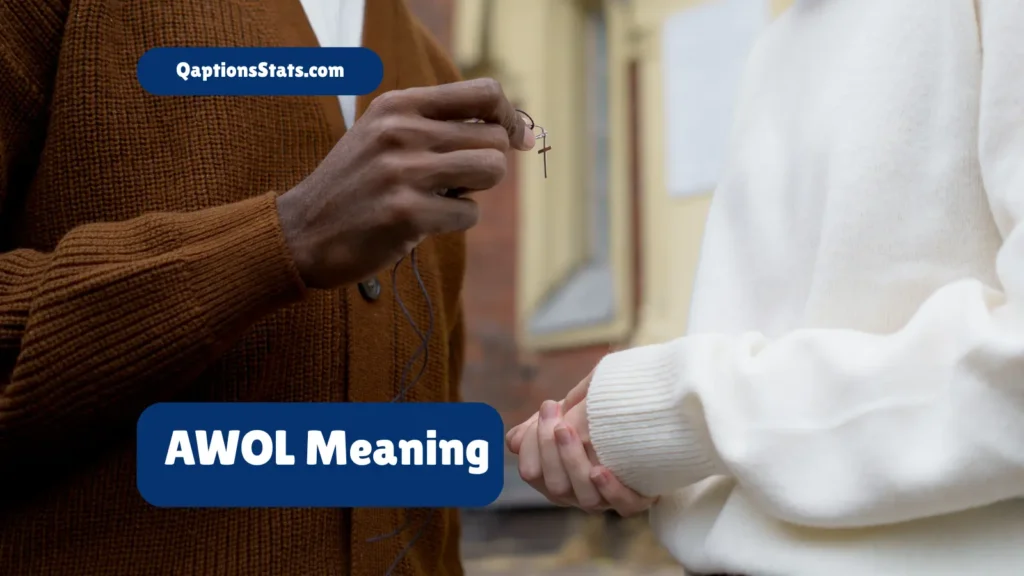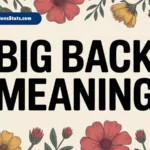In the modern world of texting, digital conversations, and casual speech, abbreviations like AWOL have crept into our everyday language. While originally rooted in military terminology, phrases like AWOL and hiatus have found their way into offices, social media, and even day-to-day personal interactions. But what exactly do these words mean in text, email, or spoken English?
In this article, we’ll go deep into:
- The meaning and origins of AWOL
- What hiatus means in everyday language
- How to use both words correctly in casual and formal contexts
- 11 polished and easy alternatives you can use instead
- How tone and situation impact your word choice
Let’s decode these terms and help you sound natural, whether you’re chatting online or crafting a professional response.
See Also: Loitering Meaning (Hiatus Meaning): Stand For And Meaning in Text
What Does AWOL Mean?
AWOL stands for “Absent Without Leave.”
It’s a term that originally comes from the military, used when a soldier is missing without official permission. However, in casual or professional language today, AWOL is often used to describe someone who is:
- Suddenly unavailable
- Not responding
- Disappeared without informing others
- On a break without explanation
Example in informal context:
“She went AWOL from the group chat last week.”
Here, it doesn’t literally mean desertion. It simply implies the person vanished without notice.
Example in work context:
“John’s been AWOL for two meetings in a row.”
This might suggest irresponsibility or a communication breakdown, especially in a team setting.
What Does Hiatus Mean?
Hiatus refers to a break or a pause in an activity, work, or communication. Unlike AWOL, a hiatus is often intentional and accepted. It carries a neutral or even positive tone when explained well.
Common Definitions:
- A temporary pause in activity
- A break from a routine
- An interruption (planned or due to burnout)
Example in professional setting:
“I’m taking a short hiatus from writing to recharge.”
Example in casual setting:
“He’s on a social media hiatus to focus on exams.”
The word is classy, respectful, and suits emails, formal announcements, and personal posts.
See Also: Big Back Meaning: Understanding the Slang and Its Implications
AWOL vs. Hiatus: The Difference
| Feature | AWOL | Hiatus |
| Intent | Usually unintentional | Often planned |
| Communication | Abrupt, no notice | Usually explained |
| Tone | Slightly negative | Neutral to positive |
| Common in | Informal talk, military talk | Professional, self-care talk |
| Example | “She’s gone AWOL again.” | “She’s taking a hiatus.” |
Stand For and Meaning in Text
In digital communication (especially on platforms like WhatsApp, Instagram, or email), AWOL has evolved into a slang phrase used mostly when someone disappears, misses deadlines, or ghosts chats.
Example in Text:
“You’ve been AWOL lately – everything okay?”
It shows concern, but may also hint at frustration or disappointment.
Tone Tip:
Using AWOL might sound harsh or passive-aggressive if the person has a valid reason for their absence. Choose softer words if you’re unsure.
11 Professional, Polite & Casual Alternatives to ‘AWOL’ or ‘Hiatus’
Whether you’re writing to a coworker or texting a friend, choosing the right phrase matters. Below are 11 refined alternatives, each explained with tone, usage, and examples.
1. “Taking a Break”
Tone: Casual, friendly
Use: Work or social media
“I’m just taking a short break from everything right now.”
This implies you’re stepping back intentionally and should return soon.
2. “Out of Office”
Tone: Professional
Use: Email, formal response
“I’ll be out of office until next Monday.”
This is perfect for formal settings, especially when setting boundaries politely.
3. “Unavailable at the Moment”
Tone: Neutral
Use: Business replies
“I’m unavailable at the moment but will reply shortly.”
Professional, concise, and respectful of others’ time.
4. “On Pause”
Tone: Calm, introspective
Use: Projects, content creation
“The podcast is on pause while we restructure things.”
Makes it clear that it’s temporary, not abandoned.
5. “Offline for a While”
Tone: Friendly, relatable
Use: Social media, personal updates
“Hey all, I’ll be offline for a while – need some headspace.”
Great for audience communication without oversharing.
6. “Stepping Away Temporarily”
Tone: Balanced, respectful
Use: Email, team communications
“I’m stepping away temporarily due to personal matters.”
This phrase is honest yet professional, suitable for colleagues and peers.
7. “In a Quiet Phase”
Tone: Poetic, reflective
Use: Creative, introspective sharing
“My art is in a quiet phase, but I’ll be back with new ideas soon.”
Ideal for writers, artists, or thought leaders on platforms like Medium.
8. “On Leave”
Tone: Formal, HR-safe
Use: Jobs, business environments
“She’s on leave until the 21st.”
This is official and doesn’t raise concerns.
9. “Taking Some Time Off”
Tone: Kind, non-confrontational
Use: Emails, life updates
“I’m taking some time off to realign my goals.”
Balanced tone for both personal and professional audiences.
10. “Not Currently Active”
Tone: Factual
Use: Projects, websites, apps
“This account is not currently active.”
Neutral and clean. Best for public notices or automated responses.
11. “On a Short Hiatus”
Tone: Elegant, soft
Use: Creative industries, public platforms
“The blog is on a short hiatus—see you in July!”
Ideal when announcing breaks while maintaining professionalism.
Choosing the Best Alternative Based on Context
It’s not just about what you say—it’s how and when you say it. Let’s break down how to choose the best expression:
✅ Use “AWOL” when…
- The person is genuinely unreachable without explanation
- You’re speaking casually with friends
- Humor or sarcasm is intended
Avoid in professional emails or when mental health may be a factor.
✅ Use “Hiatus” when…
- You are announcing a pause formally
- You want to show that it’s thoughtful and temporary
- You’re writing to your audience or team
✅ Use “Taking time off,” “On leave,” or “Unavailable” when…
- You’re setting boundaries in professional settings
- You’re updating your workplace
- You want to remain polite and neutral
✅ Use “Offline,” “Quiet phase,” or “Stepping away” when…
- Your audience knows you personally
- You want to show care for mental health or creativity
- You’re explaining an absence gently
Avoiding Tone Mistakes
When someone disappears or takes a break, especially in work or emotional settings, using the wrong phrase can sound accusatory.
❌ Saying “He’s AWOL again” about a coworker dealing with personal issues might come across as insensitive.
✅ Saying “He’s taking some time off” respects privacy and assumes positive intent.
Final Thoughts
Language evolves with culture. What once belonged to military files now colors our chats, emails, and social media captions. Knowing when and how to use terms like AWOL or hiatus—and when to choose a better alternative—can improve not just your English but also your relationships.
Whether you’re trying to update your team, check on a friend, or post a life update, the right expression sends the right message. Words matter, and tone matters even more.



